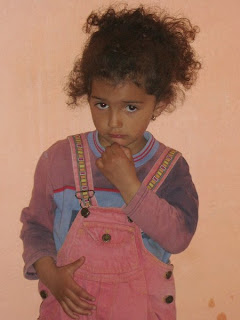culture and for many reasons.
Yesterday I received an invitation to go to the‘poor side of
town’. Which is the Rroma or ‘Gypsy’ neighborhood. It was
an eye opening experience and regardless of the fact that I
lived in poor villages in El Salvador and Senegal it doesn't
stop that feeling in the gut when seeing poverty.
Here is the worst situation … two families live in that house.

Recent history for the Rroma in Nădlac is that during the
communists' time they had to have a job. The Government
forced them to work, somewhere. After the Revolution, when
democracy arrived, they were free to do as they pleased.
Nădlac is a border town and many of the Rroma made a
living from the custom station. They either changed money,
washed windows or sold duty free cigarettes. The work was
easy, without time constraints, and unskilled.
Fast forwarding to Romania’s ascension into the European
Union and how it affected the Rroma community is where
the most difficult aspects of the problem lie.
The custom station is virtually closed and there isn't any
more duty free cigarettes. Many of the Rroma men wash
trailer trucks but that brings in pennies.
There are jobs available in factories in the city of Arad
(50 km) away, but to get a job there, one has to be literate.
When the people worked at the customs they didn’t need
an education and that is what’s coming back to haunt them
now.
It would have been better if they had to face the reality of
needing education or a skill after the Revolution. The work
at the customs did more harm than good.
This leads us to the present and a complicated situation. It is
very difficult to convince someone that they need to get literate
so that they can survive. For 20 years they lived somewhat well
without the need to either read or write. Also, they are poor now
and sending their kids to school is a far off solution. Though that
cycle of poverty can only be broken with the next generation
being literate and skillful.
They need an almost complete makeover from the life they
knew. It would have been better if the makeover started 20
years ago but the customs stations asured that it wouldn't.
An interesting thought came to mind. In the villages in El
Salvador and Senegal, though being equally as poor, the life
was a lot better.
Those villages are agricultural and like the indigenous of the
United States would say. If you have land you will eat. In the
villages there was no electricity or running water, ergo no
expenses. They grow their own food and despite the fact that
they will never be rich from that type of 2 hectare farming life,
they will be able to eat.
Here in the city, life is even more difficult. No money, no food …
no education, no job in the factory.
Despite all those miseries there is always the best part of a
population and that is the children. They do not have problems
like the parents do. But what will their lives be 15 years from
now if they don’t get education?
Here are a few pictures of some of the next generation …

We are beginning to work on this and it is a challenge … to
say the least. We have made a few positive steps and we are
finding some resources for immediate help. But that is nothing
more than a band-aid … so to speak. The permanent solution
is a long way off. Again the hardest part is to convince the
older generation that education is essential for their children.

But those children are the reason that there must be hope,
perseverance and compassion.
1 comment:
Paul, i love your blogs... i can feel your heart and enthusiasm for sharing your experiences wherever you are... Please keep up the journaling. I am living another life with you. Apple, NM, USA
Post a Comment